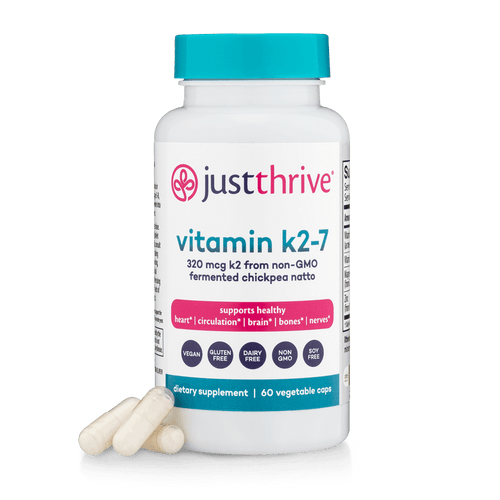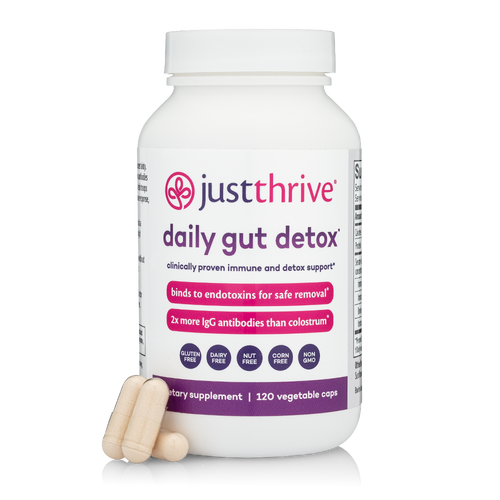The real reason you cannot get a good night’s sleep.
If you’ve been having trouble sleeping, your melatonin supplies may be running low. When your body doesn’t make enough of the sleep hormone, or deliver it at the right time, it can interfere with your sleep, and even lead to seemingly unrelated health problems.
While turning to melatonin supplements might seem like the best way to get it back on track, there’s a better way.
You can boost your body’s melatonin naturally. All you have to do is pay attention to your gut.
What Melatonin Does for You
When you think of melatonin, you probably think about a good night’s sleep. Melatonin plays an important part in your sleep/wake cycles. It gets you tired at night so you can ease into sleep. And it eases up in the morning so you can wake up feeling refreshed. But that’s just the start of how melatonin supports your overall health.
Research shows that melatonin can help:[1,2,3]
- Stop tumors
- Strengthen bones
- Fight free radicals
- Regulate inflammation
- Manage blood sugar
- Balance cholesterol
- Control blood pressure
- Protect brain cells and function
- Address pain
- Affect menstrual cycle and menopause
- Improve fertility
- Impact gut health
With all of those health effects, you want to make sure your body is producing the right amount of melatonin. And that all starts with your gut.
The Melatonin Production Line
Melatonin doesn’t just appear in your body ready to go. Your pineal gland has to produce it… at least most of it. But it has to have the right ingredients in place to create enough.
It starts with an amino acid called tryptophan. Your body gets tryptophan from food, mainly protein sources like tuna, chicken, turkey, nuts and seeds, eggs, and cheese.
Next, tryptophan gets broken down and converted into serotonin. A big part of that conversion process takes place in the gut microbiome, thanks to the beneficial bacteria that live there.[4]
Finally enzymes convert serotonin into melatonin. This takes place primarily in the pineal gland as it starts to get dark out but also occurs in the gut throughout the day. And while the pineal gland is a more well-known source for melatonin, the gut produces and retains significantly more.[5]
In fact, melatonin levels in your gut are up to 400 times higher than in the pineal gland.[6]
How Melatonin Regulates Gut Function
Your gut holds on to so much melatonin because the hormone plays a big role maintaining crucial gut functions.
Motility
Motility refers to the movement of food and waste through your digestive system. Too slow and you can get backed up, suffering symptoms like abdominal pain, bloating, and constipation. Too fast and you could end up with cramping, nausea, and diarrhea. Melatonin helps regulate gut motility, keeping it in the just-right range.[7]
Gut Barrier Integrity
Your large intestine is lined with a protective mucosal gut barrier. This barrier selectively allows nutrients and healthful compounds like antioxidants and polyphenols to enter your circulation for delivery to cells and organs. At the same time it traps pathogens, toxins, and undigested food particles inside so they can’t enter your bloodstream and cause problems.
Melatonin helps keep the gut barrier strong and healthy in two important ways:[8]
- It naturally calms inflammation in the gut to protect the mucosal barrier.
- It acts as a powerful antioxidant in the gut, shielding the mucosal barrier from damage by free radicals.
Gut Microbiome Balance
The probiotic bacteria in your gut microbiome play an important role in melatonin production. In turn, melatonin encourages probiotic gut bacteria to grow and flourish. The hormone has been shown to promote diversity in the gut microbiome and increase critical probiotic species like Akkermansia muciniphila, while decreasing potential pathogens.[9]
With melatonin regulating such critical intestinal functions, it’s no wonder that the gut has its own local production line. And that includes bacteria that directly produce melatonin.
Gut Bacteria Produce Melatonin
Along with supplying the tryptophan and serotonin that the pineal gland relies on, certain gut bacteria also create melatonin on-site. And those bacteria contribute significantly toward regulating the body’s overall melatonin levels.[10]
Several probiotic gut bacteria naturally synthesize melatonin, including:[11,12]
- Streptococcus thermophilus
- Lactobacillus casei
- Lactobacillus helveticus
- Lactobacillus reuteri
- Bifidobacterium
- Enterococcus
But, these gut bacteria can only produce melatonin when the gut microbiome is in healthy balance.

Dysbiosis Disrupts Melatonin… and Sleep
When your gut is out of balance, a condition called dysbiosis, pathogenic bacteria outnumber and overwhelm probiotic bacteria. That leads to a whole host of problems, including reduced serotonin and melatonin production in the gut.
If there aren’t enough probiotic gut bacteria to break down tryptophan or create serotonin, your pineal gland won’t have sufficient supplies to produce the melatonin you need to get a good night’s sleep. That’s why sleep disruption and GI problems often show up at the same time.[13]
Without plentiful melatonin on site, gut motility and the gut barrier can also suffer. And because the melatonin-gut microbiome relationship is a two-way street, less melatonin also means it’s harder to overcome dysbiosis.[14] Probiotic bacteria rely on melatonin for support. And when those probiotics are in short supply, melatonin will be as well.
That’s why overcoming dysbiosis and maintaining a well-balanced gut microbiome full of a diverse population of probiotic bacteria is critical for your body’s melatonin stores.
How to Overcome Dysbiosis and Support Melatonin Production
Your in-house melatonin factory can’t keep up with demand when your gut microbiome falls into dysbiosis. And once pathogens take over, they don’t want to leave. That’s when your gut microbiome will need extra support in the form of spore probiotics and targeted prebiotics.
Spore probiotics arrive in your gut 100% alive and ready to work, quickly balancing your gut microbiome by:
- Producing defensive compounds that push back against pathogenic bacteria[15]
- Helping a diverse population of beneficial bacteria grow and flourish[16]
- Producing antioxidants that fight free radicals and keep healthy cells healthy[17]
Prebiotics are the preferred food of probiotic bacteria. Prebiotics nourish and support a diverse, healthy population of probiotic bacteria in your gut microbiome. Those beneficial bacteria have favorites when it comes to their food, and they tend to prefer specific prebiotics including:
- fructooligosaccharides (FOS)
- galactooligosaccharides (GOS)
- xylooligosaccharides (XOS)
To stay in healthy balance, your gut microbiome needs support from both high-quality spore probiotics and their favorite prebiotics.
Maintain Your Melatonin Factory with Just Thrive
It takes a healthy gut microbiome to produce melatonin, the sleep hormone with a side gig of promoting gut health. To keep melatonin production where it needs to be, your gut needs the right support. And you can get that with Just Thrive Probiotic and PREbiotic.
Just Thrive Probiotic contains a proven combination of spore probiotics shown to maintain a diverse population of beneficial gut bacteria. These four clinically studied strains include:
- Bacillus subtilis HU58™
- Bacillus indicus HU36™
- Bacillus coagulans
- Bacillus clausii
Just Thrive PREbiotic contains FOS, GOS, and XOS, three types of prebiotic fiber proven to nourish only beneficial gut bacteria.
And if you’re not quite sure Just Thrive Probiotic and PREbiotic are right for you? We've got you covered!
We’re confident that when you take these gut health heroes as directed, you’ll notice a positive difference.
But if you aren’t completely happy, let us know.
Every Just Thrive purchase comes with our Bottom of the Bottle, 100% money-back guarantee. If you’re not satisfied with your purchase for any reason, you can request a full product refund at any time. Even if it’s been 3 days… 3 weeks… or 3 months. Even if the bottle is empty!
Sources
- Savage RA, Zafar N, Yohannan S, et al. Melatonin. [Updated 2024 Feb 9]. In: StatPearls [Internet]. Treasure Island (FL): StatPearls Publishing; 2025 Jan-. Available from: https://www.ncbi.nlm.nih.gov/books/NBK534823/
- Greendale GA, et al. Melatonin Patterns and Levels During the Human Menstrual Cycle and After Menopause. J Endocr Soc. 2020 Aug 27;4(11):bvaa115.
- Yong W, Ma H, Na M, Gao T, Zhang Y, Hao L, Yu H, Yang H, Deng X. Roles of melatonin in the field of reproductive medicine. Biomed Pharmacother. 2021 Dec;144:112001.
- Gao K, Mu CL, Farzi A, Zhu WY. Tryptophan Metabolism: A Link Between the Gut Microbiota and Brain. Adv Nutr. 2020 May 1;11(3):709-723.
- Konturek SJ, et al. Localization and biological activities of melatonin in intact and diseased gastrointestinal tract (GIT). J Physiol Pharmacol. 2007 Sep;58(3):381-405.
- Chen CQ, Fichna J, Bashashati M, Li YY, Storr M. Distribution, function and physiological role of melatonin in the lower gut. World J Gastroenterol. 2011 Sep 14;17(34):3888-98.
- Siah KT, Wong RK, Ho KY. Melatonin for the treatment of irritable bowel syndrome. World J Gastroenterol. 2014 Mar 14;20(10):2492-8.
- Sun X, Shao Y, Jin Y, Huai J, Zhou Q, Huang Z, Wu J. Melatonin reduces bacterial translocation by preventing damage to the intestinal mucosa in an experimental severe acute pancreatitis rat model. Exp Ther Med. 2013 Dec;6(6):1343-1349.
- Bonmatí-Carrión MÁ, Rol MA. Melatonin as a Mediator of the Gut Microbiota-Host Interaction: Implications for Health and Disease. Antioxidants (Basel). 2023 Dec 23;13(1):34.
- Zimmermann, P., Kurth, S., Pugin, B. et al. Microbial melatonin metabolism in the human intestine as a therapeutic target for dysbiosis and rhythm disorders. npj Biofilms Microbiomes 10, 139 (2024).
- Arnao MB, Giraldo-Acosta M, Castejón-Castillejo A, Losada-Lorán M, Sánchez-Herrerías P, El Mihyaoui A, Cano A, Hernández-Ruiz J. Melatonin from Microorganisms, Algae, and Plants as Possible Alternatives to Synthetic Melatonin. Metabolites. 2023 Jan 2;13(1):72.
- Liu B, et al. Gut microbiota regulates host melatonin production through epithelial cell MyD88. Gut Microbes. 2024 Jan-Dec;16(1):2313769.
- Neroni B, Evangelisti M, Radocchia G, Di Nardo G, Pantanella F, Villa MP, Schippa S. Relationship between sleep disorders and gut dysbiosis: what affects what? Sleep Med. 2021 Nov;87:1-7.
- Iesanu MI, et al. Melatonin-Microbiome Two-Sided Interaction in Dysbiosis-Associated Conditions. Antioxidants (Basel). 2022 Nov 14;11(11):2244.
- Stein T. Bacillus subtilis antibiotics: structures, syntheses and specific functions. Mol Microbiol. 2005 May;56(4):845-57.
- Marzorati M, Van den Abbeele P, Bubeck S, Bayne T, Krishnan K, Young A. Treatment with a spore-based probiotic containing five strains of Bacillus induced changes in the metabolic activity and community composition of the gut microbiota in a SHIME® model of the human gastrointestinal system. Food Res Int. 2021 Nov;149:110676.
- Crescenzo R, Mazzoli A, Cancelliere R, Bucci A, Naclerio G, Baccigalupi L, Cutting SM, Ricca E, Iossa S. Beneficial effects of carotenoid-producing cells of Bacillus indicus HU16 in a rat model of diet-induced metabolic syndrome. Benef Microbes. 2017 Oct 13;8(5):823-831














